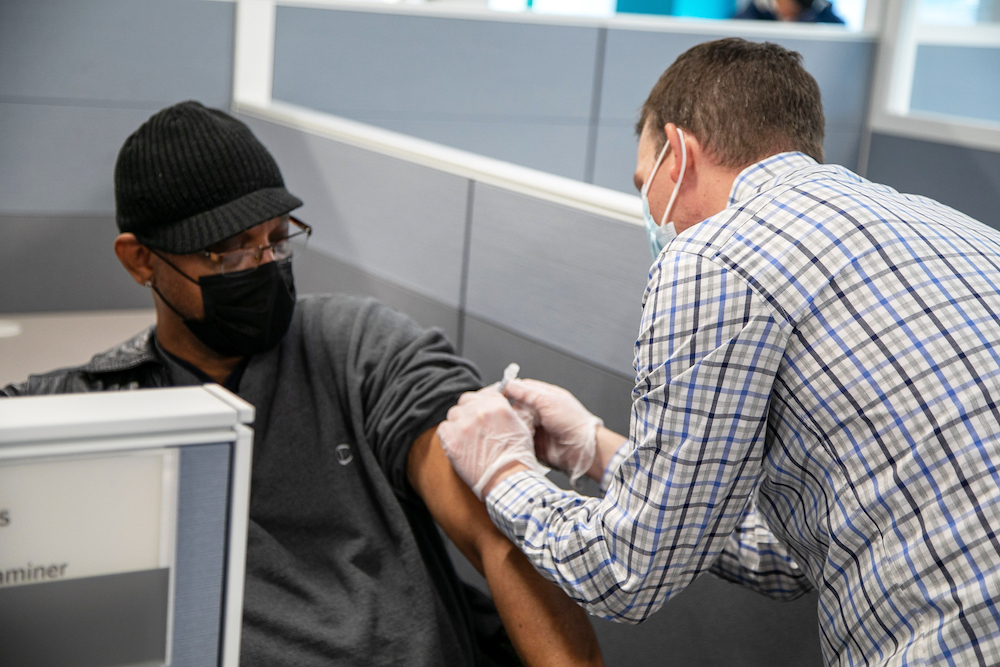Vaccine Equity: UPMC Community HealthChoice’s Collaborative Approach to Connecting Highly Vulnerable Members to COVID Vaccines

UPMC Health Plan understands that some of its members, although currently eligible for the vaccine, may be having trouble obtaining one. Some might lack access to reliable Internet service or have trouble navigating Pennsylvania’s online tools. Others may need help getting to and from a vaccine clinic, which can make them reluctant to schedule an appointment. These challenges are particularly acute with UPMC Community HealthChoices (UPMC CHC) members, UPMC’s Medicaid managed care plan that coordinates medical care and home- and community-based supports and services for individuals who are eligible for both Medicare and Medicaid. These individuals often face financial hardship, severe, chronic health conditions, and live in areas where health inequities have amplified COVID’s impacts.
As part of UPMC Health Plan’s comprehensive, wide-ranging effort to connect members to available vaccines, UPMC CHC and the other two Community HealthChoices Medicaid managed care organizations (MCOs) have partnered with the Pennsylvania Department of Human Services (DHS) and Rite Aid pharmacies to set up vaccination clinics for this vulnerable population across Pennsylvania. Specifically, UPMC CHC identified unvaccinated members and scheduled and transported them to clinics as part of this coordinated effort. UPMC Health Plan’s vice president of CHC, Brendan Harris, answered some questions on this initiative and how it fits into UPMC Health Plan’s approach to help all its members during the pandemic.
Q: Why is vaccinating this population so important, and what steps are you taking to outreach to UPMC CHC members who may want a vaccine but haven’t yet received one?
Many of our UPMC CHC members are among the most vulnerable to COVID, so it’s critical we make getting the vaccine as easy and convenient as possible. After partnering with DHS over the past year to do everything possible to keep UPMC CHC members safe, we are excited to expand our focus to make sure that these individuals can access the COVID-19 vaccinations. This population is generally low-income, faces severe, chronic health conditions, and resides in communities of color or other areas where health disparities have amplified COVID’s impacts on health status. Moreover, while some UPMC CHC members were able to secure vaccines, we learned that others were struggling to connect to the resources and support needed to get vaccinated. That’s where we and the other MCOs stepped in.
This reflects DHS’s and our shared commitment to easing access for those who may not be as well-resourced to obtain vaccines on their own, especially those in communities most affected by COVID. We were pleased to join DHS’s ongoing efforts with Rite Aid to provide this extra help. We know our members’ health-related needs better than anyone – and are therefore well equipped to identify unvaccinated members, have our award-winning health care concierges reach out to schedule appointments and, if necessary, coordinate transportation.
Who specifically is eligible?
These Rite Aid appointments are for certain CHC members and their caregivers only and not open to the public – this effort is targeting a uniquely vulnerable population for equitable vaccine access. These members haven’t had to contact us; we are reaching out directly to connect these members to the Rite Aid clinics or, if more convenient, other available vaccination sites.
Q: How has this collaboration advanced UPMC Health Plan’s commitment to ensure vaccine equity?
Through our efforts, we have targeted a diverse population. More than 61 percent of the population vaccinated across our multiple sites are from a racial or ethnic minority. These efforts also reflect the shared commitment of the CHC MCOs and the Pennsylvania DHS in making sure these individuals have the logistical and other support needed to connect them to available vaccines. Our clinics are staffed by volunteers from our incredibly dedicated team, many of whom are diverse and bilingual, which helps our membership feel at ease. We worked to reach communities of color and were successful in our efforts. Of the individuals vaccinated, over 42 percent were African American or Black, 10 percent Asian or Pacific Islander, and 10 percent Hispanic, much higher than the clinic areas. We also worked with DHS to identify local individuals who receive care through the state’s Intellectual Disability Services program and connect them to these equity-focused vaccination opportunities.
Q: How many clinics have been held so far and has this been a success?
Collectively, just in the first week of the effort, we have vaccinated over 3,200 members at three locations across the state, including Pittsburgh, Camp Hill, and Delaware County, with over 1,000 UPMC CHC members. I have attended several of these clinics and saw firsthand how relieved these individuals were – all it took to provide them with vaccines was making smart partnerships and doing the kind of proactive, clinically focused outreach that is in UPMC Health Plan’s DNA. We’re taking what we learned from these clinics and applying it to our approach in getting even more of our members connected to vaccines.
This effort really does target a specific, highly vulnerable population – one that has otherwise not had the supports and resources to get them to a clinic to receive a COVID vaccine. It has been a huge success and a great example of partnering with state and community resources to advance an equitable vaccination schedule and approach. We are looking to build upon our initial success and the strength of our collaboration with the state and with Rite Aid to schedule additional vaccination clinics in other parts of Pennsylvania.
Q: If transportation challenges are significant barriers between some members and vaccines, how are you addressing that as part of this effort?
We already help these members schedule care and, when needed, help facilitate getting them to and from their medical appointments – this is in many ways an extension of the care we already offer. And it reflects our overarching commitment to addressing health disparities that arise from various social determinants of health that can impact community and individual health status.
These targeted approaches to vaccine equity have helped us move forward on additional partnerships to help our Medicare and other members who reside in underserved communities or are otherwise struggling with health equity-related efforts to connect to vaccines. These efforts include working with the Pennsylvania Pharmacy Cares Network – a network of more than 140 pharmacies who are committed to providing high quality, patient-centered care across Pennsylvania – to connect eligible members to local pharmacies located in underserved communities and that have vaccine supply, to partnering with organizations serving communities of color by providing scheduling and logistical support for local vaccination opportunities.
Brendan Harris is Vice President of UPMC Community HealthChoices (CHC), the state’s Managed Long-Term Services and Supports program, for UPMC Insurance Services. Prior to joining UPMC, Harris served as a core member of the Department of Human Services (DHS) team for over a decade – a department that serves more than 3 million Pennsylvanians, operates with a $39 billion budget, and has over 16,000 employees.



